- Home
- Peter Grainger
Persons of Interest: A DC Smith Investigation Page 10
Persons of Interest: A DC Smith Investigation Read online
Page 10
But his attention soon turned to what Murray was saying; it mirrored exactly what he himself had found. Most of the old dealers seemed to be out of the picture now, but it wasn’t that they had simply been replaced by newer, younger ones, that law of nature applying as strictly to the dealing of drugs as it does to all other aspects of the struggle for survival; there seemed to be fewer dealers and in fewer places. As if to confirm some of what Serena Butler had said, it seemed that the money and the goods were not being exchanged in regular, known haunts – in fact, no-one seemed that sure where they were being exchanged.
John Murray said, ‘So, in the end, I tracked down one of the old dealers. He’s not one of my people, just someone who used to be in the game. I knocked on his door late last night. This was Sonny Green.’
The name was for Smith’s benefit, and he nodded.
‘Sonny Green used to shift a lot of dope, in the days when that only meant resin and grass. Is he out of it completely, John?’
‘So he reckoned. There was a whiff of it in the house but I’d say he was being straight about not dealing any more. He was reluctant but I thought he had something for me, so I said, no names, just tell me what’s going on, and he did. He told me something but he was very cagey, even then. He wasn’t the only person I spoke to last night who was somewhat anxious, and I don’t think he told me everything he knew.’
Smith said, ‘Funny, but I got the same feeling from different people. What was Sonny’s contribution in the end?’
‘I think he must have been watching wildlife documentaries. He said, when the sharks move into the bay, all the little fish go and hide. Apparently, the sharks moved into Lake a few months ago, and most of our little fish have gone and hidden.’
Alison Reeve was paying close attention; she continued looking at Murray for a moment and then turned to Smith with an expression that he found difficult to read.
He said, ‘Sonny didn’t go so far as to say what species of shark, I presume?’
‘No, no names at all, but he did say that there were outsiders involved and that they’re not all home-grown, if you know what I mean.’
Smith considered it, and then a half-smile appeared.
‘Not Albanian, by any chance?’
Murray made no attempt to conceal his surprise.
‘Where did you get that from?’
He realized immediately that he could play this coolly, be offhand about it, or he could own up that the suggestion really had been intended as a joke – but either way, it looked as if he owed Ma Budge a box of Milk Tray. Hopefully she would not require him to scale the outside of the building after dark, dressed all in black, and to hand the box in through the window while she stood there in her negligee...
He said, ‘It came up last night. I’ll be honest, I didn’t take a lot of notice of it – until now.’
Reeve was trying to catch his eye – she wanted a word, and it was plainly something that she didn’t want to say in here.
John Murray said, ‘Well, that’s what he told me – that whoever was trying to run the show in Lake is using some muscle from outside – ‘soldiers’ Sonny called them – and these are some nasty pieces of work. He told me that they are Albanian.’
Reeve had stood up.
‘Well done, John, and the rest of you. Remember – intelligence gathering. DC, a quick word?’
Outside in the corridor she said, ‘Sorry, DC, but we had no idea that it would surface as quickly as this.’
‘We?’
She looked slightly apologetic, and she was also looking for the right words.
Smith said, ‘RSCU – it’s what they’re looking at, isn’t it?’
‘Yes.’
‘Well why not just say it in the briefing yesterday?’
Two uniformed men approached and passed by them – she waited until they were out of earshot before she answered.
‘They have their reasons and it makes some sense to me. They want information from the ground up, to see what comes from the street – if they had laid it all out there and then, we would be looking at it differently – we would be looking for foreigners instead of at the whole picture.’
He could not disagree, having taken similar approaches himself in the past.
She added, ‘After Wednesday’s meeting, things should be clearer. We’ll start to focus down on some individuals.’
‘Well, the S team has got there first, as usual. How do you want me to handle this now?’
‘It was good solid work from John, and it cannot be unsaid. You can tell them it is significant but not to pass it on to other teams yet – we need to see what else turns up in different places.’
‘Will do – they’ll keep their mouths closed for a day or two.’
Reeve said, ‘Happy with Serena, now that she’s settled in?’
You had to hand it to the detective inspector – she didn’t miss much.
‘Yes, we’re going to make a lovely couple. She’s like the daughter I never had.’
‘Now it’s funny you should say that, but I can see certain similarities.’
‘Yes, and she was reminding me of a certain female detective I used to work with as well. I should be taking it easy now, approaching retirement, in the twilight of my career.’
As she walked away, Reeve began singing ‘That’ll Be The Day’, and Smith thought, I didn’t know you were a contralto.
Nigel Hinton’s email was brief – friendly enough but it did include a plea for Smith not mention to anyone that he had received it. He forwarded it to his home email address, and would delete it from this one when he had read it this afternoon; its path could still be found that way but not quite so easily as if he simply left it here for all to see. He had never been convinced that officers’ emails were not looked over from time to time.
The first attachment was simply a list of the names of the inmates who had been interviewed so far during the investigation into Everett’s death. A quick glance told Smith that Billy Slater was not one of them. From that he could draw a couple of conclusions: one, that Slater had not been seen as a regular associate of the murdered man, and two, that the one or two meetings that had taken place between them had not been observed by prison staff or other inmates who had been spoken to; he could make those assumptions, but even those might be unwise. Perhaps the meetings had been observed but they had not been reported; perhaps the meetings had never taken place at all, and Slater was part of a conspiracy to lay some false trail for the investigation. To some that would seem like paranoia but Smith had been deceived too often to allow it to happen easily again – Slater was a criminal, and they were never to be trusted.
As he watched the others at work, making a brief record of what they had done the previous evening, he went back through his own meeting with Slater, and reconsidered his interpretation of what Slater had said, why he had agreed to meet the detective and apparently place himself at some risk. Slater had said something like “He didn’t deserve that”. Was that enough? Did it explain an otherwise uncharacteristic act? Had Slater had an attack of altruism? Maybe he really had been in the chapel on Sunday morning. They are never to be trusted, but still a judgment has to be made, and for now Smith’s was that Slater had been telling the truth, more or less.
The second attachment was a summary of the profile that Inspector Terek’s team had constructed so far of Lionel Everett. It was Lucky’s CV, and contained little that Smith had not already found in his own quick searches the previous day but there was some more up-to-date family background – he had been married, there had been two children, but this had all broken down years ago. The woman had moved away to Walsall with the children by the look of it but there was a note saying that she had been contacted about the demise of her former partner – a local officer would interview her but it was clearly being seen as a matter of routine rather than of any possible significance. Lucky’s parents were either deceased or had run away as well – there was no mention of them. His next-of-
kin, according to the prison records, was one Sandra Fellowes, sister, followed by a phone number but no address.
Smith looked away from the screen, not quite able to believe his eyes. Murray was typing away slowly and methodically, Waters, his screen visible as a reflection in the window behind him, was about to Google something, as usual – probably day-dreaming of that moment when he would be made Detective Superintendent of Drones in the cyber-crime unit of the future, and Serena Butler was tapping away on her mobile with one hand while the other pretended to be still busy on the keyboard – Smith wondered whether it was a new friend or one of her old ones.
Then he looked back at the attachment he had opened, and it was still there – the landline number with a Kings Lake code. How the hell had they missed that? Were they so far south – all of an hour’s drive in a clapped-out Peugeot – that they did not know, did not recognize the STDs of other urban centres? Surely someone from the Huntingdon police had contacted the next of kin – they would not have left that only to the prison service, would they? But it was conceivable that Terek or someone in his team had handed it over to family liaison, and she – sorry, but it usually is – might well have known nothing about the mobile number found in Everett’s cell, the one that belonged to a detective sergeant from Kings Lake Central. Whatever the explanation, he would not have been happy if anyone in his own team had missed it.
Now what? He could email straight back, with a polite, I happened to notice sort of comment, and leave it to them. But then, as it would involve the territory thing again, it would have to go back up the chain of command and then down again at this end, and they would probably ask someone from Kings Lake to follow it up anyway – assuming that anyone thought it worthwhile in the first place. And here it was in front of him, he was someone from Kings Lake and the address attached to that phone number would be no more than twenty minutes’ drive away. He could, alternatively, email back and say that he would follow it up on their behalf, sort of covering himself – but then they might tell him not to do so, and then he would never know the whole story. Or... he could email back and then go out immediately before they could tell him any such thing. That looked a possibility, but there were a few basic things to do first.
Sandra Fellowes was present on the electoral roll – now he had an address. She had been at that address for a number of years, so it was likely that she still lived there. A search of criminal records told him that she did not have one, but searching with the address brought up someone who did – one Jack Fellowes, whose main claim to fame seemed to be the sheer variety of minor offences at which he had failed to be successful. Jack, however, did not appear on the electoral roll which would suggest that the marriage had broken down – lives of crime and long marriages rarely seem to go together well. Or maybe Jack was making a political statement by refusing to register. Of course, there might not have been a marriage at all – she might simply have taken his surname. Within fifteen minutes he had the answer, not simply to that question but to several others as well – there had been a marriage alright, seventeen years ago, between Jack William Fellowes and Sandra Gillian Everett.
Smith went back to Fellowes’ criminal record and read it more carefully. There was nothing to tie him to his brother-in-law’s extensive research into the evasion of fuel duty, no hint that the two of them had ever worked together. Fellowes had been active in and around Lake, though, and he just happened to be someone that Smith had not encountered personally – there were still a few of them left, even after all these years. He read the case notes for Fellowes’ most recent arrest, which was three years ago, and saw that one of the detectives involved in the investigation into the theft of goods from lorries parked overnight in laybys was Mike Dunn – that might be handy. The mitigation statement given in court mentioned children, so Mrs Fellowes presumably still had the family at the address in Roydon Hill. The oldest might seventeen or eighteen by now but he or she had not yet appeared on the Kings Lake Central radar.
So, there it was – Lucky Everett had a sister living in Kings Lake. She was his next of kin, occupying that odd little space on a form that we fill in without thinking, never imagining that one day it will inevitably be required. How that explained his mobile number being in her brother’s possession, let alone perhaps being involved in his murder, Smith had no idea but he was certain that it would help to explain it eventually, if only someone was asking the right questions.
He wrote the email to Nigel Hinton but did not press send – this might all be in the timing. He would take Waters with him for a number of reasons, not the least of them being that that the young man had already spent enough time with Serena Butler this week, and also that Waters already knew something about the Lucky Everett story. When Smith looked up, he could see that Waters was still busy and so he took out his own mobile, pressed ‘Messages’ and found the last one from Jo Evison. He wrote Still operational, avoided arrest so far. Will tell you about it sometime. I hope you enjoyed your weekend. If she wasn’t occupied, she might reply straight away – if she was, then it might be days. He copied a few details from the screen in front of him into his notebook, and then sent the email to Nigel Hinton.
‘Come on, Watson. My public awaits. Let’s get back out there.’
As Waters was logging off, Smith got a message back – Glad to hear it – not anything to do with that prison stabbing, was it? Smith blinked and had to read that two or three times. A lucky guess? She was a very good writer; perhaps she had been an even better DI. He sent back You’re beginning to worry me now, and waited, refusing to look at his email inbox on the computer screen, just in case. Waters was waiting at the door, and Smith saw an amused look pass between him and Serena as Smith stood, phone in expectant hand like a schoolgirl. A few more seconds later she sent I would hate to do that but there was something I wanted to tell you on Saturday. Let me know a good time to ring, J.
Chapter Nine
Even though they had worked together on and off for the best part of a year now, a ride out with Smith to a new part of the town or its surrounding countryside would often still involve short lessons about local history, culture or geography. Today it was the latter. Roydon Hill actually is on a hill, the last or the first of the low West Norfolk hills, depending on which way you are travelling. This part of the county is, apparently, the result of an interesting mixture of glacial processes, and before the seas rose to cut off the land bridge it had ties to southern Scandinavia, where even today there are similar topographical formations. Waters thought that he had feigned sufficient interest but the ensuing silence from Smith should have warned him.
The car passed by the left turn that would have taken them into the housing estate, the last one before the open fields of wheat, sugar beet and oilseed rape began, between the trimmed hedgerows and scattered trees of the modern arable landscape. The road climbed the last few metres and then they were at the top of the hill, veering left and looking back across and down at Kings Lake – the hill was much higher when you were on it than it seemed to be when it was only a smudge low on the eastern horizon. There was a layby of sorts, a flattened verge where people who were missing North Wales or the Lake District might park up for a few minutes, close their eyes and imagine or remember.
Smith pulled over onto the verge and switched off the engine. He got out, walked around the front of the car and stood looking back over the town, a few feet away from where Waters continued to sit in the passenger seat of the car.
After a moment of contemplation, Smith said, ‘Nice view, isn’t it?’
‘Yes.’
‘Don’t you do views?’
‘Yes – sometimes. On holidays...’
Smith turned, glanced at him and looked away again.
‘Yes, that’s it, isn’t it? People spend small fortunes year in, year out, searching for the spectacular, flying all over the planet. Instead of that, they could just take a closer look at what’s around them every day. I suppose I mean start actually
seeing instead of just looking or not even bothering to do that.’
They were clearly going to be here for a few minutes – Waters opened the door and got out of the car.
Smith said, ‘I mean, when you look at this, it’s – hello, I’m going to get a bit lyrical, you’ve been warned – it’s like a tapestry, isn’t it, woven by time with the threads of history and geography. Physical processes manipulated by the needs and wishes of people have all run together to create this view at this moment. It’s unique and in five minutes, five seconds even, it will be different again...’
At some point in the morning, the sun that had shone for several days had disappeared behind a thickening veil of cloud. The air was still warm with it though, and scented with the coconut sweetness of the gorse that was blooming on the road verge to their right; when no car was approaching or passing, there was the soft humming of bees. From here, the town didn’t look so bad, and it was difficult to recall some of the grim discoveries that Waters had been involved with over the past few months.
He said, ‘It’s just modern life – it’s fast. People don’t have time to sit around, stopping and staring and all that.’
‘No, I don’t agree – it’s about getting your priorities straight. It’s not about how much time you have, it’s about what you do with it.’
It looked as if this afternoon’s minor studies lecture was to be in moral philosophy, and Waters wondered what Serena Butler and John Murray were doing at that moment.
Smith continued – ‘I was reading some First World War diaries recently – fancied something a bit light-hearted after my usual stuff. Anyway, there was this one chap who kept detailed records of all the butterflies he saw while they were fighting in the trenches – he’d obviously been an expert before he went out there. While the shells were whistling about his ears, he was making notes on the courtship behaviour of the Lesser-spotted Fritillary or whatever.’

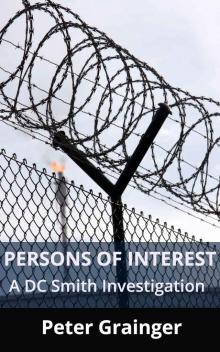 Persons of Interest
Persons of Interest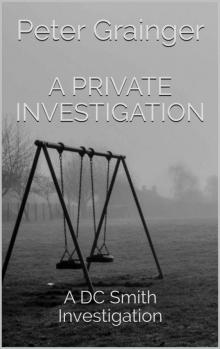 A Private Investigation
A Private Investigation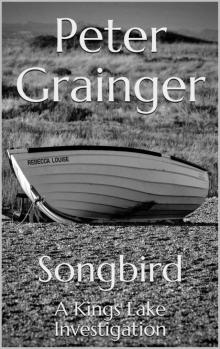 Songbird
Songbird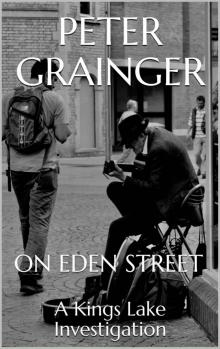 On Eden Street
On Eden Street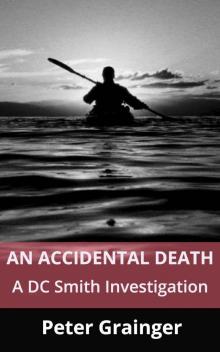 An Accidental Death
An Accidental Death Time and Tide
Time and Tide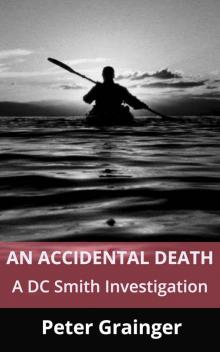 An Accidental Death: A DC Smith Investigation
An Accidental Death: A DC Smith Investigation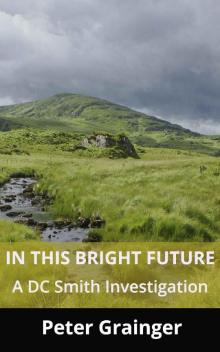 In This Bright Future
In This Bright Future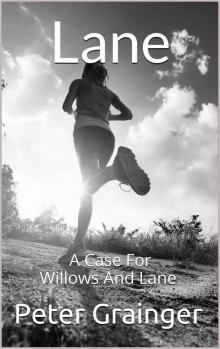 Lane: A Case For Willows And Lane
Lane: A Case For Willows And Lane The Rags of Time: A DC Smith Investigation
The Rags of Time: A DC Smith Investigation Luck and Judgement
Luck and Judgement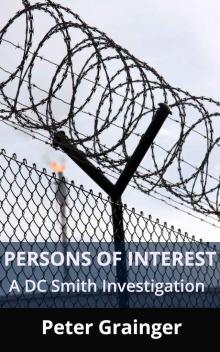 Persons of Interest: A DC Smith Investigation
Persons of Interest: A DC Smith Investigation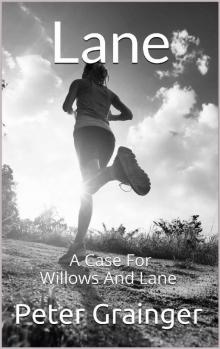 Lane
Lane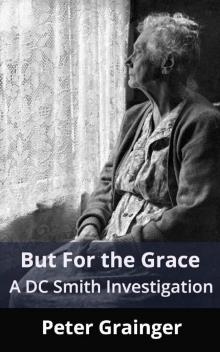 But For The Grace
But For The Grace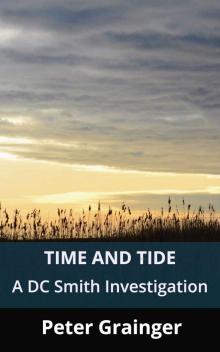 Time and Tide: A DC Smith Investigation
Time and Tide: A DC Smith Investigation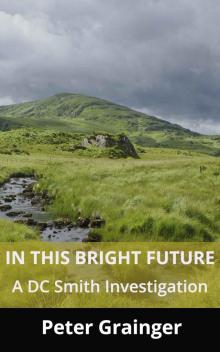 In This Bright Future: A DC Smith Investigation
In This Bright Future: A DC Smith Investigation The Rags of Time
The Rags of Time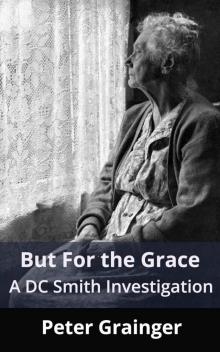 But For The Grace: A DC Smith Investigation
But For The Grace: A DC Smith Investigation Luck and Judgement: A DC Smith Investigation
Luck and Judgement: A DC Smith Investigation